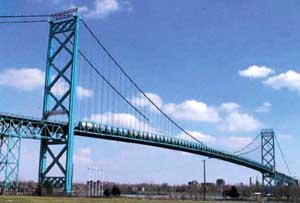-
- Stepping Stone to develop sexual behavior relapse prevention program
- Kehoe’s Father’s Day resolution causes stir in state Assembly
- Gay man released from Tijuana prison
- GLBT community gathers to honor political trailblazer
- State unveils anti-tobacco campaign targeting GLBT community
- Pride grants $105,000 to local organizations through Human Dignity Foundation
- Community News
-
- California Supreme Court limits judges’ membership in Boy Scouts
- Southern Baptists oppose gay marriage, defend right to ‘penetrate’ world
- Gay US citizens visit Canada to get hitched
- N.M. anti-discrimination law won’t be suspended by petition effort
- Bill to strike ‘sodomy’ from New York law
- San Francisco turns to Internet to curb rise in syphilis
- Presbyterians oust minister over gay marriages
- Oregon Senate panel weighs gay rights bill
- National News Briefs
- World News Briefs
national
Gay US citizens visit Canada to get hitched
Court battles over gay marriage expected to intensify in U.S.
Published Thursday, 26-Jun-2003 in issue 809
DETROIT (AP) — Gay American couples are beginning to head for the border city of Windsor, Ontario (near Detroit), to take advantage of court-ordered legalization of same-sex marriages.
By the morning of June 19, 13 gay couples, three of them American, had been granted marriage licenses in Windsor, according to city licensing clerk Diane Sibley.
Ferndale residents Jennifer Paty and Erin James were among those planning to head to Windsor to seek a marriage license. They just need to do some paperwork required in Canada, certifying James’ divorce 15 years ago.
“We’ve waited this long, we can wait a little while longer,” Paty told The Detroit News.
An Ontario appeals court declared Canada’s definition of marriage as the union of a man and woman invalid and changed it to a union between two people. The move prompted a conservative group in Michigan to urge the strengthening of Michigan law against same-sex marriages.
Hours after the decision, two Canadian men tied the knot in the country’s first legal same-sex wedding. The ruling applies only in Ontario, but on June 17, Canadian Prime Minister Jean Chretien announced that he would propose a bill to legalize gay marriage throughout the country. Currently, only Belgium and the Netherlands recognize same-sex marriages.
Among those who brought the suit against Canadian officials were an American couple living in Windsor, Hedy Halpern and Colleen Rogers. The two met in 1997 in Ann Arbor at a big group dinner. Rogers, 52, was raised a Catholic and had been married and divorced twice, both times to men. She has two sons. Halpern was a Jewish feminist who realized at 18 that she was attracted to women.
They fell for each other that night in Ann Arbor. Soon, they were looking for a home together.
Only one thing remained: a wedding. Though Canada would legally recognize them as common-law partners, it would not legally recognize them as married. But like many gay couples, they decided to have a wedding ceremony anyway.
They were planning their wedding when a friend told them about a lawyer who was looking for stable gay couples to add to an important lawsuit.
“What struck me was that I was too old for the government to tell me who I could marry and who to love,” said Rogers.
They had a commitment ceremony in May 2000 but remained unmarried.
On the day the decision came down, Rogers called Halpern at work, bursting to tell her the news. Now, they can get a marriage license any time they want. They plan to have a small ceremony and sign the papers in front of a few friends and family members.
Meanwhile gays and lesbians across the United States are likening the current climate to that of Germans as the Berlin Wall crumbled. They have high hopes that Massachusetts’ supreme court will take a similar step within a few weeks, predicting that litigation will spread to other states, and the end result — perhaps after years of lawsuits and legislative battles — will be legalized gay marriage nationwide.
Roman Catholic leaders in Massachusetts, in a recent statement to parishioners, said a high court ruling redefining marriage “will have devastating consequences here and nationally.”
The Massachusetts case involves a lawsuit filed by seven same-sex couples who sought marriage licenses in 2001. When they were rebuffed, they sued the state Department of Public Health. The case is now before the Massachusetts Supreme Judicial Court.
On both sides of the debate, advocacy groups expect that gay couples who marry in Canada — or any state that legalizes gay marriage — will attempt to have their marriages recognized elsewhere.
However, 37 states and the federal government have adopted Defense of Marriage Acts in recent years, defining marriage as a union between a man and a woman. Many are expecting lawsuits.
Cindy Meneghin and Maureen Kilian, partners since a high school romance 28 years ago, don’t want to rely on foreign laws. They want to be married in their home state of New Jersey, and are among the couples who filed a gay-marriage lawsuit there last year.
“The ruling in Canada gives us hope,” Kilian said. “But we want to wait and see it through in New Jersey. Our home is here, our families are here.”
|
|
Copyright © 2003-2025 Uptown Publications


